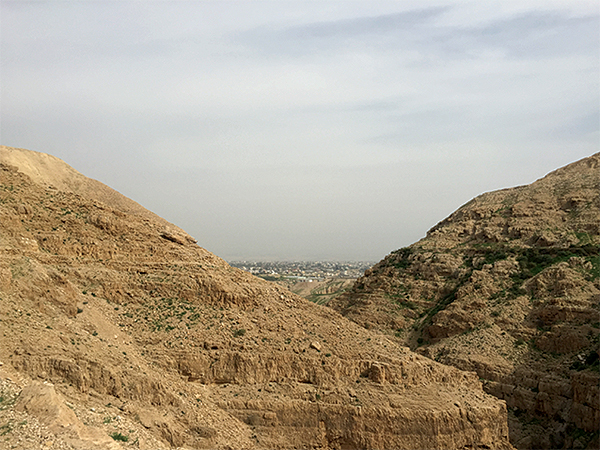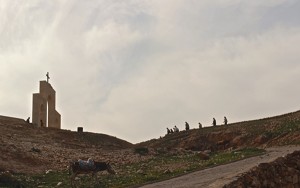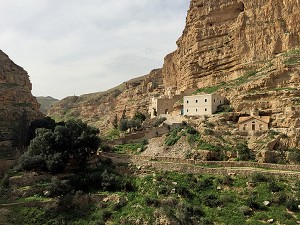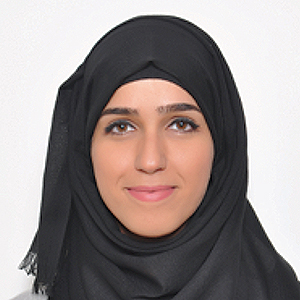
I still remember the day when I sat at the edge of a rocky cliff in Wales overlooking one of the most beautiful beaches in the entire world, feeling envious that we do not have similar places in Palestine. I have lived in the United Kingdom and traveled to Sri Lanka, the United States, Lebanon, and Jordan, and I always want to travel more, not only because it’s exciting, but also because it is a form of spiritual transformation. When I traveled, I understood the world around me and myself, but there was always something missing: I was still ignorant about my own country. I am almost 100 percent certain if Palestinians were asked about their favorite destinations in Palestine, their answers would be as strikingly predictable as Bethlehem, Jerusalem, Nablus, Jericho, or some city in the land occupied in 1948, known as Israel. I realized I was one of those people, so I decided to start another journey, but within the borders of my own country this time.
In January, the Birzeit-based Rozana Association invited me to hike in Wadi Qelt, a valley located between the holy city of Jerusalem and the oldest city in the world, Jericho. I was feeling a growing sense of curiosity, so I agreed without hesitation. I was extremely excited about the idea of hiking, but I didn’t expect to have an adventure that would change my attitude towards the tourism potential of Palestine. I took the familiar road to Jericho, but this time turned off from the highway following the sign reading Wadi Qelt in Arabic, English, and Hebrew. We kept driving for another fifteen minutes until we started seeing tourists and Palestinian vendors in the distance. A cross was peaking from the tip of a hill, and a few donkeys were carelessly grazing the dry plants. The gate stood on its own like a portal that vowed to send us back into the past, to an era where miracles were a possibility.
♦ Every twenty minutes, like clockwork, water spurts out of a spring and collects into a pool. According to a Palestinian legend, two demons living below the spring are engaged in a never-ending battle. When the good demon gets the upper hand, water pours out of the spring. If the bad demon prevails, the flow miraculously slows down. The spring is known as Ein Fawwar, a living legend that locals consider lucky and one of Wadi Qelt’s wonders.
The adventurous hikers, in sturdy shoes clutching cold water bottles, descended into the belly of the valley. Crosses could be spotted everywhere as we walked the same route that Jesus Christ took on his journey from Jerusalem to Jericho. Pride seeped into my soul knowing that Jesus Christ and I share the same homeland. We zigzagged our way up again while listening to the growling of a stream running beneath an old bridge. We then reached the Monastery of St. George (Deir Al-Qelt in Arabic), a complex housing a chapel crowned with a small cave that is believed to have been carved into the rocks 900 years before the birth of Christ. The monastery is home to around ten Greek monks who continue the tradition of living the experiences and celebrating the lives of the prophets.

I had a quick chat with the monk who welcomed us to the monastery. It didn’t matter to me that I follow a different faith. On the contrary, it made me realize that, when it comes to spirituality, we are the same. The fact that I was a practicing Muslim female wearing a hijab, and he is a practicing Orthodox Christian monk made the conversation even more enlightening. He walked me to a chamber extensively decorated with candles and flowers, and showed me a dozen skulls sitting in a glass box. I cried out, finding the idea quite foreign. But he took no offense and told me it is a special way to celebrate the lives of saints. The diversity of the human tradition is fascinating.
He told me over 3,000 priests lived across the valley in small caves where they mediate and worship God. Mar Elias, for example, lived in the valley for three years and the Virgin Mary’s father, Imran, also known as Joachim in the Christian tradition, stayed in the cave above the monastery and prayed to God to give him a child. Rozana’s staff team leader, Rafat Washaha, whom we called Abu Jamil, told me that not only Christian monks, but also Sufi Muslims took shelter in the valley’s wilderness, away from the mundane pleasures of life, to experience the highest levels of spirituality. The valley has embraced people from all faiths who, despite their differences, were after one thing, understanding and appreciating their existence. Abu Jamil and the monk became my tutors and I began picturing humble men bringing to life the now quiet valley, growing comfortable with the creatures of the night, thinking about the almighty Lord and trying to answer the difficult questions. “Lets get going,” a young man interrupted my stream of thoughts.
As we hiked the narrow trails, Abu Jamil told us all about the history of the valley. At one point we were standing a hundred feet apart, but I could still hear him clearly because of the echo. I said jokingly, “No need for telephones!” Experiencing the simple life the monks lived made me appreciate the technology and modern luxuries we take for granted too often.
“Look! A fox,” a man with grey-streaked hair yelled. “A Ferret?” I replied doubtfully. Abu Jamil corrected us saying it was a rabbit. The valley is inhabited by wild rabbits, which are brown in color, to blend with the rocks and hide from hungry predators. After walking for five hours, the valley faded out slowly and we found ourselves standing at the outskirts of Jericho heading towards Herod’s Palace. I couldn’t believe we had walked from Jerusalem in the west to Jericho in the east. I was surprised at how relaxed and entertaining the hike was. I stood in the greenish fields and looked back at the hills, now remembering the rocky cliff in Wales.

My friends and I always complain that Israel has deprived us of our right to know our country. I disagree; our ignorance has robbed us of that right. This is why Rozana began organizing hikes five years ago on twenty-five trails in Ramallah, Salfit, Nablus, Jenin, and Hebron. The results are promising, as many Palestinians and internationals are participating. Samar, a 21-year-old Palestinian from Germany, said that she joined the hike, because she wanted to know her country as more than just a place of conflict. “It is good to see this side of Palestine, just to see its beauty and to be able to see the historical aspects.” Her friend Laura, 23, is from Germany and studying at Birzeit University. She said the hike was an eye-opener. “I didn’t know about the landscape in Palestine. I thought it would be a surprise and it was a good surprise.” Sitting around a table in Jericho we concluded our day eating Musakhan, a Palestinian dish made of roasted chicken baked with onions, sumac, and fried pine nuts and served over traditional taboun bread,
and reflecting on our hike. I couldn’t have been more proud of the country I call home.
In a time where people are blinded by materialism and dazzling commercials about destinations that have little to no cultural value, it is essential that we take the time to explore ourselves and the universe around us, challenge our beliefs, and educate ourselves by living the experiences of our ancestors. It is possible that through advancing the concept of meaningful tourism, we could teach ourselves that entertainment and education shouldn’t necessarily be separate, and that through taking a spiritual approach to tourism, we could support our country, appreciate our heritage, and bolster our economy.
» Malak Hasan is a Palestinian journalist and amateur photographer who lives minutes away from Jerusalem. She holds a master’s degree in communication and public relations from the United Kingdom and is currently in charge of the English page of the Palestine News Agency WAFA. You can follow her on Twitter: @MalakHsn.


